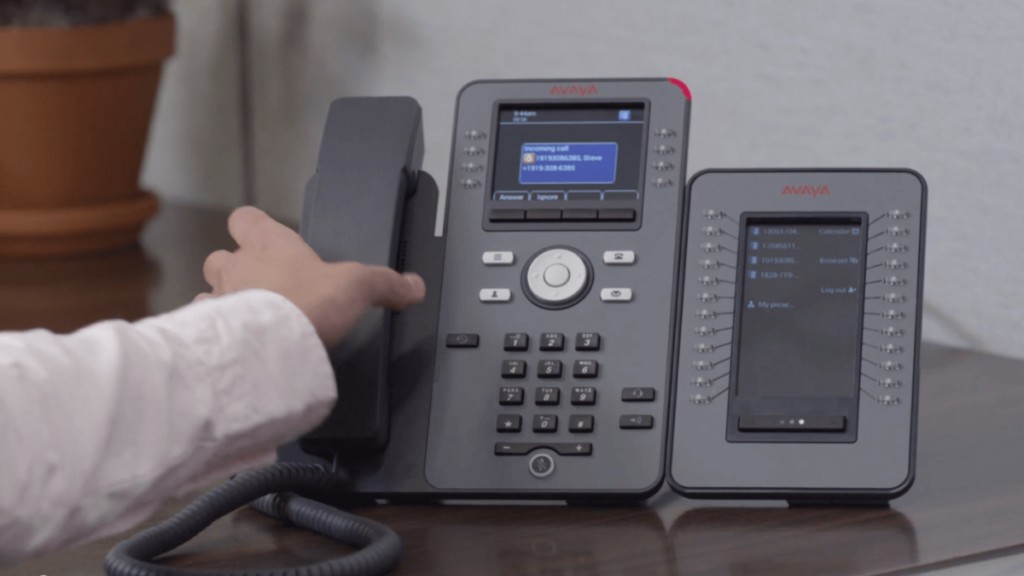Choosing the right phone systems for small businesses is critical when you are looking to stay connected and operate efficiently. In this post, we’ll guide you through the top options, key features to consider, and why we recommend the Avaya J100 Series as the best solution on the market.
- Our Recommendation: Avaya J100 Series
- The Best Phone Systems for Small Businesses: Reasons Why the J100 Series Is #1
- Types of Small Business Phone Systems Available
- What To Look For When Choosing Phone Systems for Small Businesses
- Phone Systems for Small Businesses: The Best Brands
- Frequently Asked Questions About Phone Systems for Small Businesses
With the right phone system, your small business can improve communication, boost productivity, and deliver a better customer experience. We hope this guide helps you make a confident, informed decision. Contact us today if you would like help choosing the perfect phone system for your needs.
The Best Phone Systems for Small Businesses
1. Our Recommendation: Avaya J100 Series
Avaya is trusted by hundreds of thousands of growing businesses around the world
Avaya is trusted by hundreds of thousands of growing businesses around the world and for good reason. They are renowned for high-quality, extremely reliable phone systems. It’s no surprise then that our recommendation for the best office phone systems for small businesses is the Avaya IX™ J100 IP Phones.
The J100 series represents Avaya’s latest generation of IP Phones. These phone systems are optimized for use on Avaya and selected non-Avaya call servers. The Avaya IX™ J100 IP Phones use a refreshed industrial design and common software which will give you a consistent installation and user experience.
2. The Best Phone Systems for Small Businesses: Reasons Why the J100 Series Is #1
Avaya J100 Series IP Phones provide you with a wide range of applications and features for unified communications. These phones leverage the enterprise IP network and eliminate the need for a separate voice network. These phones also offer superior audio quality with the amplified handsets and customization with low power requirements in a Session Initiation Protocol (SIP) environment.
Avaya J100 Series IP Phones give you the flexibility you need, so you can:
- Make conference calls more efficiently and enhance your customer interactions with high-quality audio
- Gain access to information quickly through easy-to-read high-resolution displays
- Create a survivable, scalable infrastructure that delivers reliable performance and flexible growth as your business needs change
- Increase performance by deploying Gigabit Ethernet within your infrastructure
- Reduce energy costs by using efficient Power-over-Ethernet (PoE) including sleep mode, which lowers energy consumption significantly
- Enhance audio quality by using amplified handset mode
With these powerful features, the Avaya J100 Series delivers a reliable, future-ready phone solution designed to grow with your business and improve everyday communication.
Avaya J100 Series give you a wide range of applications and features for unified
communications
Avaya J100 Series Has a Model Suited for All Your Staff
Each role in your business has unique needs. Avaya recognizes that not every phone is suited to every position. That’s why the J100 series has a telephone model for everyone in your business, including your executives/managers, administrative assistants/receptionists, everyday users, and walkup users.
Here are the most popular models in the series:
Avaya J129 IP Phone
Summary: The Avaya J129 IP Phone is a cost-effective basic phone intended for simple communication, where making and receiving calls is your primary need.
Best Suited for: It works great as a location-based phone in lobbies, waiting rooms, lunch areas, warehouses, classrooms, or retail spaces. It can also be used for basic office use by a single user.
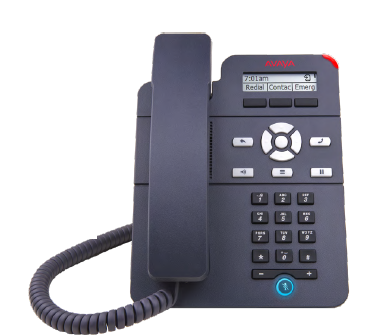
Avaya J139 IP Phone
Summary: The Avaya IX™ J139 IP Phone is a cost-effective, entry-level IP Phone that addresses the need for secure, basic voice communications for users within large enterprises and small and medium-sized companies.
Best suited for: It is well suited for business workers that need only the most frequently used features such as “hold”, “transfer”, and “voicemail.”
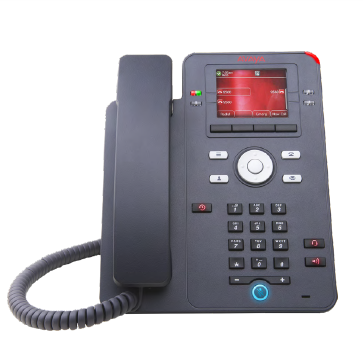
Avaya J159 IP Phone
Summary: The Avaya IX™ J159 IP Phone is a competitively priced, high-performing IP Phone that is perfect if you want a small form factor on your desk that is packed with lots of feature buttons.
Best suited for: It is a multiline phone ideally suited for power users who consider the phone to be one of many useful communication tools and who rely on common functions like directory and speed dial to enhance productivity and collaboration.
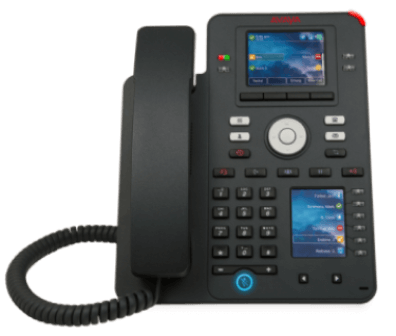
Avaya J169 IP Phone
Summary: The Avaya J169 IP Phone is competitively priced and features a grayscale display, 4 soft keys, high definition audio quality, integrated Gigabit Ethernet interface, headset support, and up to three 24-button Expansion Modules.
Best Suited for: The J169 IP Phone leverages your enterprise IP network to it can give you sophisticated voice communications from headquarters, remote locations, or home offices.
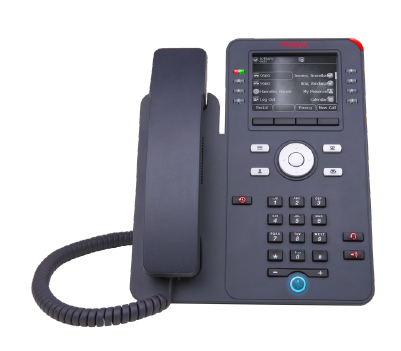
Avaya J179 IP Phone
Summary: The Avaya J179 IP Phone is an IP Phone that addresses the need for everyday voice communications. It is designed for medium to high volume users and it offers a full range of telephony, productivity and collaboration features.
Best Suited for: This model is the perfect choice for professionals, knowledge workers, salespeople and call centres.
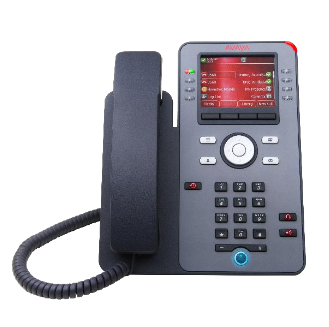
3. Types of Small Business Phone Systems Available
There are several types of small business phone systems to choose from. These include traditional landlines, virtual systems, and VoIP. The VoIP category can be further divided into two types: on-premise and cloud-based.
Landlines

Landlines cost more than VoIP systems. – Image by Dieter Stehle from Pixabay
For decades the traditional landline phone system has been the staple office phone system for small businesses. A landline is an analog system that runs on your telephone company’s copper wiring.
This type of system is also known as a public switched telephone network (PSTN) and is made up of a “collection of individual telephones that are hardwired to a public exchange.” Some landline systems today are actually hybrids, meaning that they have a traditional phone line that is connected to the company’s data network and then VoIP telephones are connected to the network.
Advantages:
- Reliable: Landline systems are very reliable and rarely fail.
- High Quality: The call quality on a landline is very clear.
- Comfort: Most users are very comfortable with the traditional landline system.
Disadvantages:
- Cost: Often business landline systems cost significantly more in monthly charges than VoIP systems.
- Repairs & Upgrades: Because so many phone system providers are moving away from traditional landline systems, it is becoming more difficult to purchase replacement parts or find technicians trained to repair them.
While traditional landline systems offer reliable performance and clear call quality, they can be costly to maintain and are becoming harder to support as the industry shifts toward digital solutions.
Virtual

A virtual phone system can give your company a more professional appearance
Some businesses choose to use a virtual phone system instead of a traditional one. This is done by connecting your main business phone numbers to workers who are not located in a central office and who work remotely using their cell or home phones.
When a client calls the business number the call is transferred to the appropriate employee’s mobile or home device where they answer it. To the customer, it seems as if they are calling an office and not someone’s cell phone.
Advantages:
- Professional Appearance: The virtual phone system allows smaller companies to give a professional appearance to their customers by mimicking an actual landline system.
- Variety of Features: This type of system will allow you to use a number of helpful features including automated receptionists, voicemail, call forwarding, call screening, and online faxing.
Disadvantages:
- Costs for Employees: With a virtual system, all of the calls are processed and charged to the receiver’s cell phone or mobile device. This means that they will be using up their own mobile or home phone minutes.
- Extra Accounting: If you reimburse your employees, it will mean additional accounting to keep track of and separate their personal calls from their work-related ones.
While virtual phone systems offer a professional image and valuable features, it’s important to weigh those benefits against potential employee costs and added administrative work.
VoIP

VoIP systems run on your current Internet connection
Unlike traditional landlines, VoIP phone systems use your business’s Internet connection to operate online. Learn more about VoIP phone systems in our post “What is VoIP?”
Advantages:
- Lower Cost: Your VoIP monthly bill will be significantly cheaper than your previous landline bill
- Easy Installation and Set-Up: VoIP systems can be set up using your current Internet connection so there is no need to run extra cabling.
- Advanced Features: You can enjoy a wide range of advanced features such as automated attendants, call queues, voicemail to written email messages, and transfers to mobile devices.
Disadvantages:
- Call Quality: If you have a poor or spotty Internet connection, you may find that the call quality is poor and that you get disconnected from time to time.
- Availability: If you can’t get a fast or reliable Internet service, you probably shouldn’t choose a VoIP system.
VoIP systems offer impressive cost savings and modern features, but their performance depends heavily on having a strong and reliable internet connection.
On-Premise VoIP
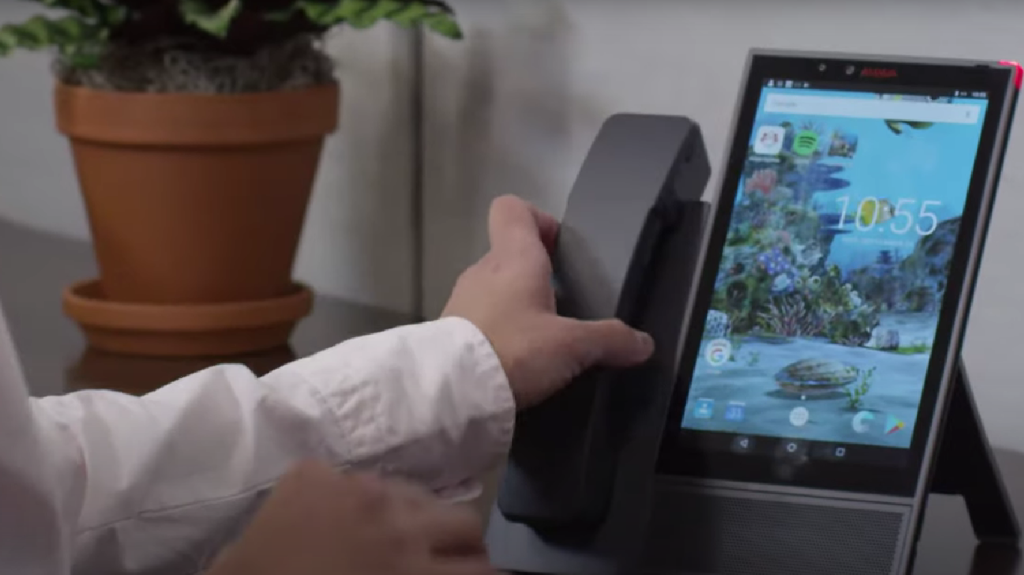
An on-premise phone system will give you more control
Some businesses choose to have their VoIP system on-premise. This means that all of their equipment (such as their PBX hardware) is located in their physical building.
Advantages:
- Control: You are in complete control of your telecommunication system and you can make sure that it is always up and running and configured specifically for you.
- Security: If your business has compliance or regulatory restrictions, then it is probably better to look after your telecommunications in-house rather than on the cloud.
- Monthly Costs: Once you have made your initial investment, your ongoing monthly fees will be relatively inexpensive.
Disadvantages:
- Large Initial Cost: You will have significant initial capital costs to have all of your equipment in-house.
- Ongoing Maintenance: You will also need someone on your staff who understands a VoIP system and is able to look after its maintenance.
Owning and managing an in-house VoIP system offers greater control and long-term savings, but it requires a higher upfront investment and ongoing technical expertise.
Cloud-Based VoIP

With a cloud-based VoIP phone system your service provider will house, maintain, and upgrade all of the PBX technology.
With a cloud-based VoIP phone system for small businesses, your service provider will house, maintain, and upgrade all of the PBX technology for you.
Advantages:
- Maintenance: Your service provider will look after all of the maintenance required for your system except that of the actual phones.
- Scalability: As your business grows, it will be very easy to add new lines. If your business is seasonal or goes through cycles when it isn’t as busy, you can also easily eliminate lines to cut down on costs.
- Monthly fees: You are usually charged a monthly rate per user which is cheaper than a traditional landline.
Disadvantages:
- Less Control: You are not in control of the hardware.
- Possible Downtime: You have to rely on your service provider to fix any problems if the system goes down which could result in a loss of business.
A cloud-based VoIP system offers flexibility, scalability, and reduced costs, but it also means relying on your provider for system maintenance and uptime.
4. What To Look For When Choosing Phone Systems for Small Businesses

The best phone systems for small businesses make access to and sharing of information fast and intuitive.
The following elements are what you should look for when you are considering a new office telephone system:
Look for Collaboration Capabilities
Close collaboration with both customers and fellow employees is crucial to any business. The best phone systems are ones that make the access and sharing of information fast and intuitive. Collaboration features, such as conference calls, are essential to many businesses. Nearly all of Network Telecom’s handsets come with conference calling capabilities.
Systems are also available that can integrate your business phone with your mobile device. This feature allows for calls to be forwarded to your cell phone, so you will never miss an important call.
Look for Great Features
Basic calling features are the core of every business phone system. Phone systems can utilize a wide range of features in order to provide the best communication experience. Popular features include:
- Customizable Voicemail
- Caller ID
- Call Waiting
- Call Forwarding to a mobile device
- Voicemail to an Email
- Automated Call Menu
These essential features help ensure smooth, professional, and efficient communication for any business.

Advanced features also become available depending on the nature of the phone system sold:
- Audio Conferencing Hardware (for full-room audio broadcasting and capture)
- Video Conferencing Hardware
- Send/Receive Data Files
The features listed are just some of the wide range of features available through a business telecom system. For more information, visit our products and services page.

Look for Optimal Phone System Rates
The right business phone system must also have the optimal calling rates that allow for a business to operate within their budget.
Network Telecom works with our clients to provide the best combination of features and call minutes to set up our customers for success without spending extra on features and systems that they do not need. Contact us for detailed pricing info.

5. Phone Systems for Small Businesses: The Best Brands
Which phone system is the best depends on the needs of the business asking the question. There is no one phone system that is the best for every company. The best telecom system is powered by the best brands in hardware/software.
Network Telecom offers solutions from many of the top brand names and we are a certified partner of many of the largest business communication system companies such as Avaya, Panasonic, Nortel, Bell, and Rogers. Our solutions are not biased to any one brand and as such we can recommend the best solution from many brands for your business.
When determining what the best phone systems for small businesses are, you need to look at what you need your system to do, and then find a system that does all of those things reliably and at a fair price.
In order to complete this analysis, we suggest that you contact one of our sales representatives. They can help you navigate through which brand and model is the best for your needs. Click here to view all of the brands we offer and service.
6. Frequently Asked Questions About Phone Systems for Small Businesses
Can’t I just keep using my landline system? Do I really have to switch?
Your landline system will probably keep functioning at a high level for many years to come, however, the problem is that no new technology is being developed for landlines.
This means that as new upgrades and features are made, you won’t be able to take advantage of them. The other issue is that it will become more difficult to find parts for your systems or technicians who are able to repair them.
Is the quality of call on a VoIP system as good as a landline?

The quality of VoIP calls is now usually as good as landline calls
When VoIP first came out, the quality was definitely inferior to that of a landline. However, the technology has improved significantly over the years so that now it is almost impossible to tell the difference between the two types.
To make sure that your VoIP calls are as high quality as possible, you should make sure that you have enough bandwidth to handle the number of calls that you receive and that your network is set up so that incoming calls get priority over other types of Internet traffic.
How do I know which system is best for my business?
Each business is unique and so are their telecommunication needs. That’s why there isn’t one right system for every business. It depends on a number of factors such as your budget, the number of employees you have, how quickly you think you will grow, if you have access to high-speed and reliable internet, and what features you require.
It may be helpful to get advice from a reliable, third party to help you analyze your situation and make the best choice.
Why do we need a virtual system? Can’t we just use our mobile phones on their own?
You can use your mobile phones on their own, however, if you are trying to compete with larger companies, you will want to give your customers a more professional impression and a sense that your company is able to compete with larger competitors.
Mobile phones on their own cannot provide you with the valuable services that give this impression, such as call forwarding, auto-attendant, voicemail to email, and music on hold.
Do I have to switch from my current landline system to a VoIP system?
VoIP may not be the best option for your particular needs. The experts at Network Telecom can help you determine whether an analog landline, VoIP, or a combination of both is your best option. If you are not ready to switch, we can help you find ways to save on your current monthly phone bill, and we offer training to help you make the most out of your current system.
If you are looking to expand your current system, we offer cabling and installation and technical support 24 hours a day, 7 days a week, 365 days a year!
Why Network Telecom is the Best Choice for Phone Systems for Small Businesses

The experts at Network Telecom can help you choose the best phone systems for small businesses.
Small businesses are the backbone of any economic community. The right telecom solutions will set up a small business for success as they are able to better communicate with staff members, customers and prospects.
Network Telecom works with many different companies around Southern Ontario in order to provide the best phone systems for small businesses possible. Our services span the full range of telecom technology and we offer solutions from the strongest brands in the industry. Contact us today to learn more.
We Offer 24/7 Service and Maintenance
Errors, outages and other usage issues can sometimes grind a phone system to a halt. It is important to be able to quickly diagnose and repair any problems that might occur. Network Telecom offers 24/7 support to our customers in order to keep their systems running smoothly.
In turn, customers will often call a business phone system in order to request help and support. A high-quality phone system will process customers faster and provide more clear communication. A business phone system from Network Telecom will ensure that it is easy for your customers to contact you.
At Network Telecom we provide exceptional support for all of our customers, meaning we are available at any hour, any day of the year. In the unfortunate event of a system outage or failure, we will respond as fast as possible in order to get your telecom systems fully back online. Contact us to speak to our support staff.

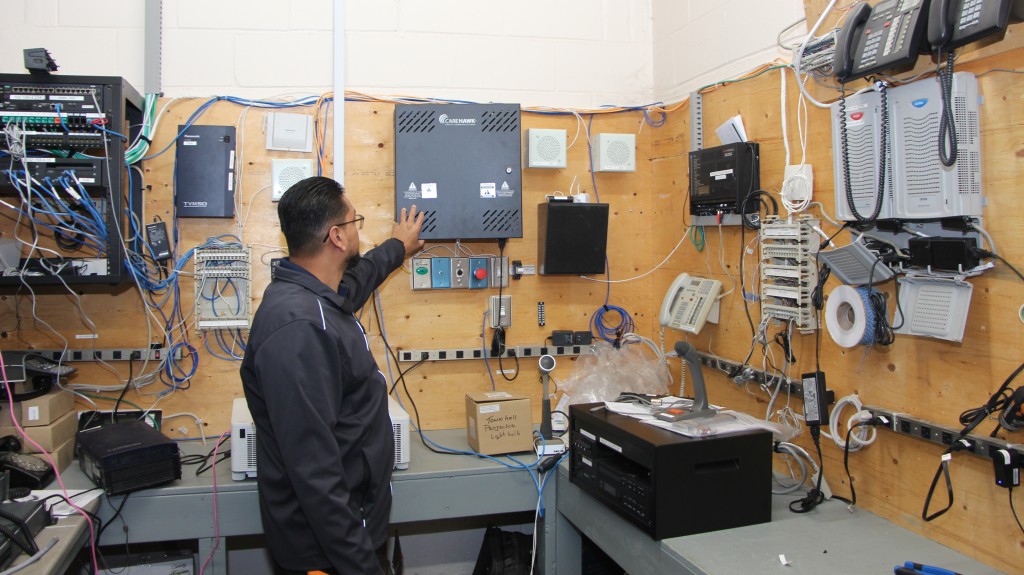
For the Best Phone Systems for Small Businesses, Trust Network Telecom
If you are looking for the best phone systems for small businesses, contact Network Telecom. Network Telecom has been in operation since 1979. Our decades of experience working with all aspects of business telecommunication technology throughout all of the innovations and changes of the information age have allowed us to become the best possible solution for your business telecom needs. Our goal is to provide purchase support and technical service that is unmatched.
In addition, if your phone system is not working as it should, our trained technicians are available to help 24 hours a day, 7 days a week, 365 days a year. We carry a huge selection of parts in order to quickly solve any components issue you are experiencing. If you are having a telecommunication or networking issue, we can resolve it quickly and professionally.
In addition to our accredited and certified technical expertise, we offer:
- Consultative Sales
- Cloud Services
- Ongoing Support
- Voice Mail Systems
- System Design + Consulting
- System Admin + User Training
- PA Systems
- VoIP Specialist
- Network Cabling
Network Telecom operates in the Kitchener-Waterloo, Cambridge, and Guelph region. Contact us today for all of your telecommunication questions and concerns; we’d be happy to help you.
“The entire project was orchestrated with minimal telephone system downtime, and the ongoing support we have received from them has been reliable and efficient.”



